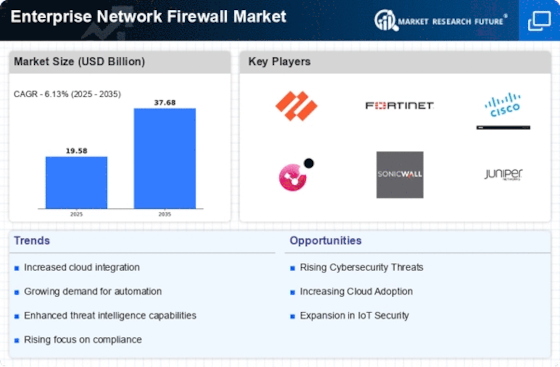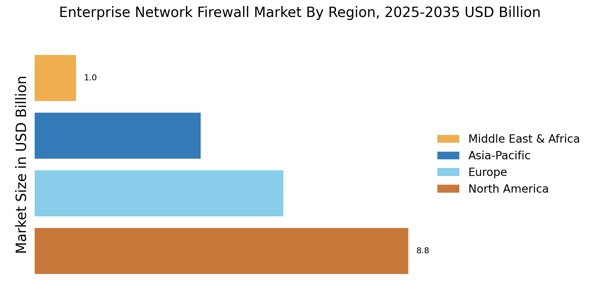Rising Cybersecurity Threats
The increasing frequency and sophistication of cyber threats is a primary driver for the Enterprise Network Firewall Market. Organizations are facing a myriad of attacks, including ransomware, phishing, and advanced persistent threats. As a result, the demand for robust firewall solutions is surging. According to recent data, the cybersecurity market is projected to reach USD 345 billion by 2026, indicating a strong correlation with the need for advanced firewall technologies. Enterprises are compelled to invest in comprehensive security measures, including firewalls, to safeguard sensitive data and maintain operational integrity. This trend underscores the critical role of firewalls in protecting networks from evolving threats, thereby propelling the growth of the Enterprise Network Firewall Market.
Increased Adoption of Remote Work
The shift towards remote work has significantly influenced the Enterprise Network Firewall Market. As organizations adapt to flexible work arrangements, the need for secure remote access to corporate networks has become paramount. Firewalls play a crucial role in ensuring that remote connections are secure and that sensitive information is protected from unauthorized access. Data suggests that the remote workforce is expected to remain at elevated levels, with approximately 30% of employees working remotely by 2026. This trend necessitates the deployment of advanced firewall solutions that can effectively manage and secure remote access, thereby driving demand within the Enterprise Network Firewall Market.
Regulatory Compliance Requirements
The stringent regulatory landscape surrounding data protection and privacy is a significant driver for the Enterprise Network Firewall Market. Organizations are increasingly required to comply with regulations such as GDPR, HIPAA, and PCI DSS, which mandate robust security measures to protect sensitive information. Failure to comply can result in severe penalties and reputational damage. As a result, enterprises are investing in advanced firewall solutions to ensure compliance and protect against data breaches. The market for compliance-related security solutions is expected to grow, with estimates suggesting a compound annual growth rate of over 10% through 2025. This regulatory pressure is a key factor propelling the growth of the Enterprise Network Firewall Market.
Technological Advancements in Firewall Solutions
Technological innovations in firewall solutions are driving the evolution of the Enterprise Network Firewall Market. The integration of advanced features such as intrusion detection and prevention systems, deep packet inspection, and application awareness is enhancing the effectiveness of firewalls. These advancements enable organizations to better identify and mitigate threats in real-time. The market for next-generation firewalls is projected to grow significantly, with estimates indicating a market size of USD 10 billion by 2025. As enterprises seek to leverage these advanced capabilities to bolster their security posture, the demand for innovative firewall solutions continues to rise, thereby fueling the growth of the Enterprise Network Firewall Market.
Growing Awareness of Cybersecurity Best Practices
The increasing awareness of cybersecurity best practices among organizations is a notable driver for the Enterprise Network Firewall Market. As businesses recognize the importance of proactive security measures, there is a growing emphasis on implementing comprehensive firewall solutions as part of their cybersecurity strategies. Educational initiatives and industry standards are promoting the adoption of firewalls as essential components of network security. Data indicates that organizations investing in cybersecurity training and awareness programs are more likely to implement effective security measures, including firewalls. This heightened awareness is likely to contribute to the sustained growth of the Enterprise Network Firewall Market.

















